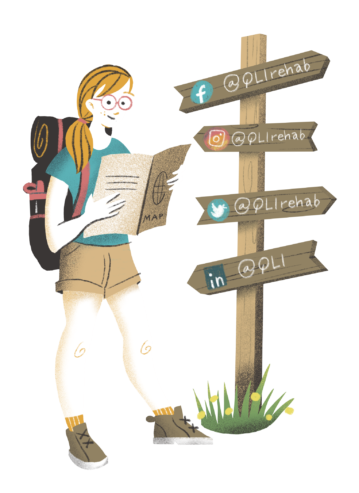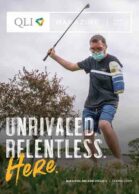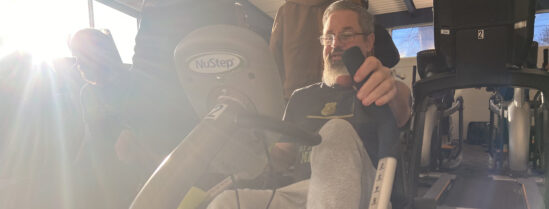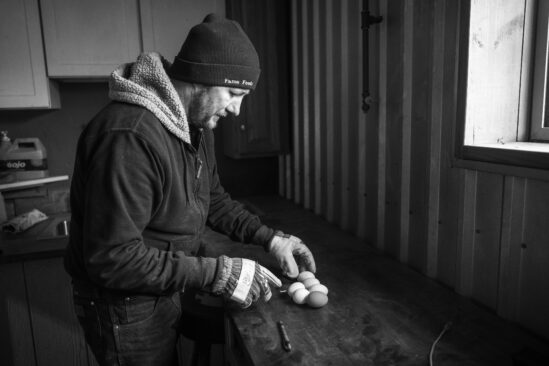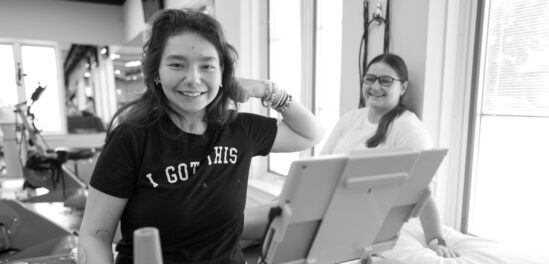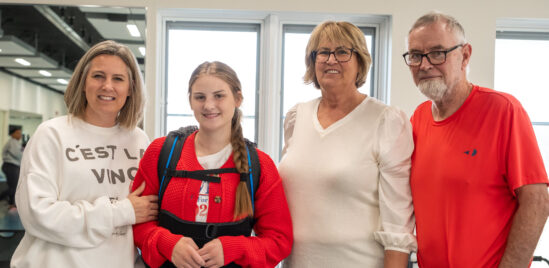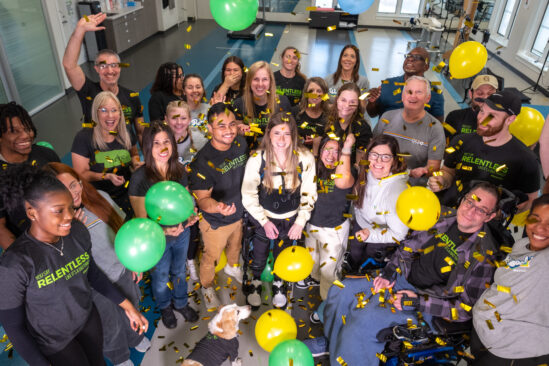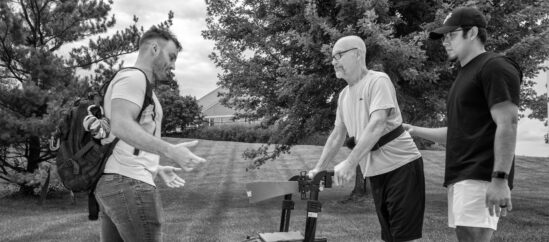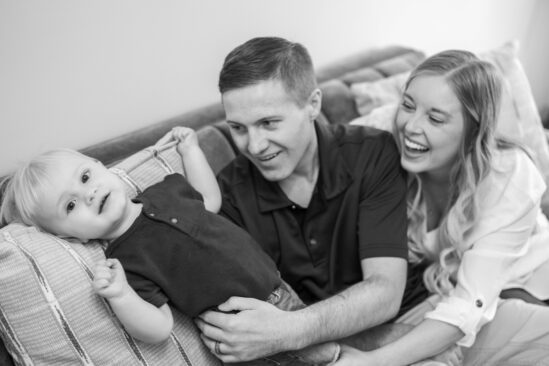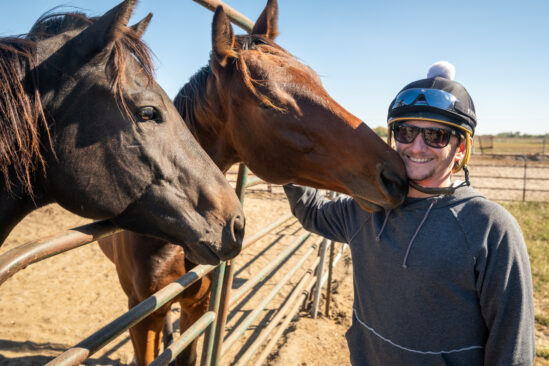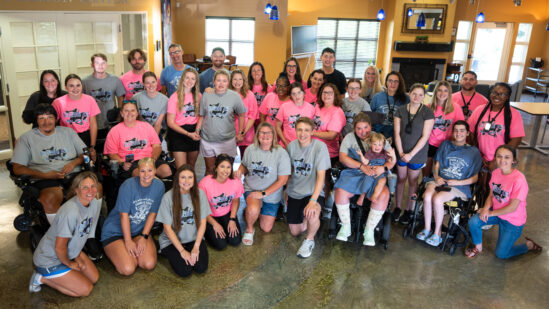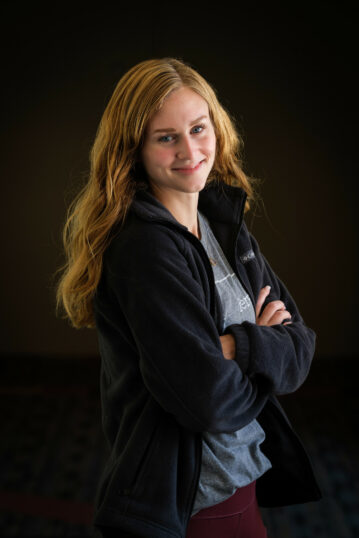 QLI’s newest nurse remembers her first day at QLI.
QLI’s newest nurse remembers her first day at QLI.
Just a high school senior in 2019, Kaitlyn Baker was someone whose life was an ambitious exercise in balancing academics, athletics, and a steady job.
But despite having earned an associate’s degree during her high school tenure and pursuing continued study in business, her future remained fogged over. Something wasn’t working. She felt her interest waning, her patience thinning.
It wasn’t long before she pivoted away from business toward a career path where she could be a force for good in others’ lives.
She chose healthcare. And, as a student participating in Omaha’s Avenue Scholars program, that choice led her to QLI.
QLI’s landscape was daunting. She was, for all intents and purposes, surrounded by unknown variables. She’d never seen catastrophic injury this closely, had never held responsibilities in this specialized level of care.
“I’d definitely call it scary,” she says. “It was a different atmosphere. It was a lot to take in right away.”
But Baker wasn’t alone. In fact, her introduction to QLI signaled a wave of change for the company.
Alongside 11 high school seniors from the Omaha area, Baker had been invited to take part in the first semester-long training session of a then-unnamed workforce development program. This brand-new initiative aimed to equip students from disadvantaged socioeconomic backgrounds with the job-specific skills, leadership and professionalism training, and Certified Nursing Assistant accreditation necessary to secure lasting careers in healthcare.
Today, nearly three years and 100 high school graduates-turned-CNAs later, that program is known as IMPACT.
—
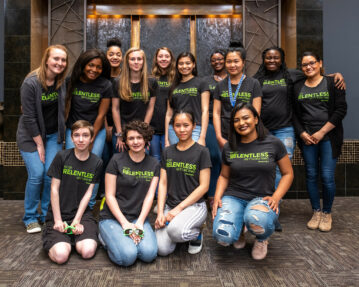 This very first class of IMPACT became a kind of template for the program, a roadmap future groups might follow from or iterate on. Spearheaded by Melissa Elvig and Yuri Carrazco-Cortez, prominent leaders within QLI’s clinical system, IMPACT was built to deliver a state-certified CNA training curriculum within the context of a dynamic rehabilitation environment.
This very first class of IMPACT became a kind of template for the program, a roadmap future groups might follow from or iterate on. Spearheaded by Melissa Elvig and Yuri Carrazco-Cortez, prominent leaders within QLI’s clinical system, IMPACT was built to deliver a state-certified CNA training curriculum within the context of a dynamic rehabilitation environment.
Even to this day, the program threads bookwork into true-to-life healthcare practice. Students observe and work hands-on alongside the nursing and residential experts powering QLI’s everyday operations.
And that’s just the cursory pitch. For students like Baker, IMPACT creates the greatest change by giving young healthcare prospects access to professional mentoring.
“When Kaitlyn first arrived, the notable thing was her shyness, her timidness,” says Elvig. “Building her confidence was our real focus.”
The pair of instructors embraced Kaitlyn’s eager mentality. They stayed after hours with the student, coaching her through the rigorous academic work—often offering to join her in one of QLI’s rehabilitation units to practice repetitions of skills in a real-world setting.
“It was clear Kaitlyn was a quick learner,” says Carrazco-Cortez, “because we’d usually only need to explain a concept or a strategy once before she was applying it with real efficiency. It’s one thing to know the skill but another to use it. She could do both easily.”
Baker calls Elvig and Carrazo-Cortez her “two moms,” passing along her success as a credit to their empathy.
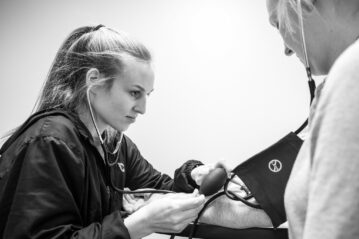 “There were times when it felt like they were in your brain,” she says. “They see themselves in you, they know the mistakes you’re on the verge of making, and they take the time to walk you through a problem no matter how many times you need to repeat it.”
“There were times when it felt like they were in your brain,” she says. “They see themselves in you, they know the mistakes you’re on the verge of making, and they take the time to walk you through a problem no matter how many times you need to repeat it.”
Together, the trio’s relationship grew around a shared sense of humor. Elvig refers to Baker as a “giggler,” someone whose laughter snowballed, sparking laughing fits amongst the group and, sometimes, the entire class.
Baker responds to the label with a defiant laugh: “Melissa’s a giggler, too!”
This humor peeled away layers of the young student’s bashfulness, shedding outward anxiety to forefront her real strengths—her curiosity and detailed insight.
And as the semester continued, Baker not only absorbed the responsibilities of a CNA, but understood the vital change she could effect on those she served.
—
IMPACT is not a funnel meant for onboarding employees into QLI’s workforce.
Instead, the question it answers is broader, driven more by the needs of the community than the simplicity of convenience:
In an era where healthcare organizations struggle against recurring staffing shortages, how can businesses proactively cultivate talent and while also empowering a marginalized population?
Many IMPACT graduates have gone on to work in healthcare organizations throughout Omaha. Others have embraced their newfound passion in this diverse and rewarding industry, pursuing advanced degrees and additional training.
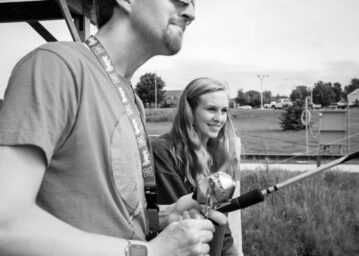 Kaitlyn Baker’s case is unique. After graduating from high school and, likewise, IMPACT, she maintained academic ambitions—hoping, eventually, to earn a spot as a nurse in a leading clinical team.
Kaitlyn Baker’s case is unique. After graduating from high school and, likewise, IMPACT, she maintained academic ambitions—hoping, eventually, to earn a spot as a nurse in a leading clinical team.
But she had also found a workplace where she felt she belonged, where her ideas were heard, where her relationships to peers and medical clients mattered, where she would have further chances for professional growth and leadership development.
That place, of course, was QLI.
“I knew QLI was just the perfect place to work,” she says. “I had already learned so much here and I knew there was more that I could do.”
Baker joined QLI’s residential team as a rehabilitation trainer, a frontline position in which she could put her freshly earned CNA training to use being a day-to-day resource for individuals and families working toward recovery after catastrophic injury.
She quickly rose to stardom within QLI’s ranks, gaining notoriety for her sharp humor and relatable, humble sensibility.
Perhaps most crucial to her success was an ability to forge relationships with QLI’s rehabilitation clients. Whether during brief stays or across the span of extended therapy programs, the individuals who called QLI a home away from home were quick to see the passion Baker held for her work.
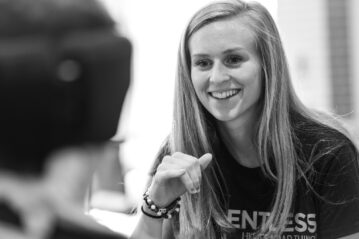 “Empathy is one of those things that makes you better at what you do here,” she says. “When you’re here, you get an appreciation for being in other peoples’ shoes.”
“Empathy is one of those things that makes you better at what you do here,” she says. “When you’re here, you get an appreciation for being in other peoples’ shoes.”
Baker says her sense of empathy is a motivator.
“It changes your perspective forever. You get invested in being a part of these stories. Everyone’s growing, all at once. The residents are getting stronger, better. And you’re growing, too, emotionally and mentally.”
For Baker, that growth took place inside and outside the workplace.
“My friends tell me all the time now that I’m not the same shy, anxious little girl I was back in high school. I feel more confident, like I can say ‘Hi! Hello!’ to someone and not feel like a child. That’s a good thing. I’ve grown in a good way.”
Of course, her growth has encompassed her academic pursuits as well. In Summer 2021, Baker completed the coursework necessary to earn Licensed Practical Nurse accreditation. QLI responded in kind, offering Baker a position on its East Campus nursing team, where a squad of specialists dedicate themselves to delivering the highest possible care to the long-term residents of QLI’s Summit.
She accepted the position without hesitation.
Her ambitions continue forward, even still. Next year, she plans to earn Registered Nurse accreditation, and will soon be on the doorstep of a Bachelor of Science in Nursing.
She regards these passing mile markers with a mix of disbelief and contentment. It wasn’t long ago that she was just a high school student staring down a business degree. But, in healthcare, she’s found more than success—she has found a path forward.
“At this point I’ve realized I just love learning. I love the science. I see myself being a Nurse Practitioner someday.”
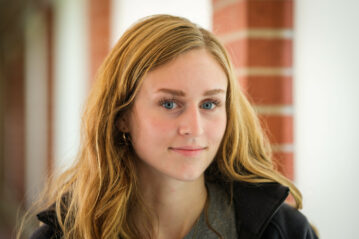 Considering her pace, that reality might not be too far afield.
Considering her pace, that reality might not be too far afield.
Melissa Elvig and Yuri Carrazco-Cortez refuse to take credit for Baker’s continued achievements. Instead, they watch, cheerleading from the sidelines. Baker is one of many pupils they’ve coached into the industry, one of many success stories.
The pride never fades. Not for a moment.
“Her story is the reason we have this program at all,” Elvig says. “Our job is simply to open the door. Kaitlyn’s the one who stormed through it.”


